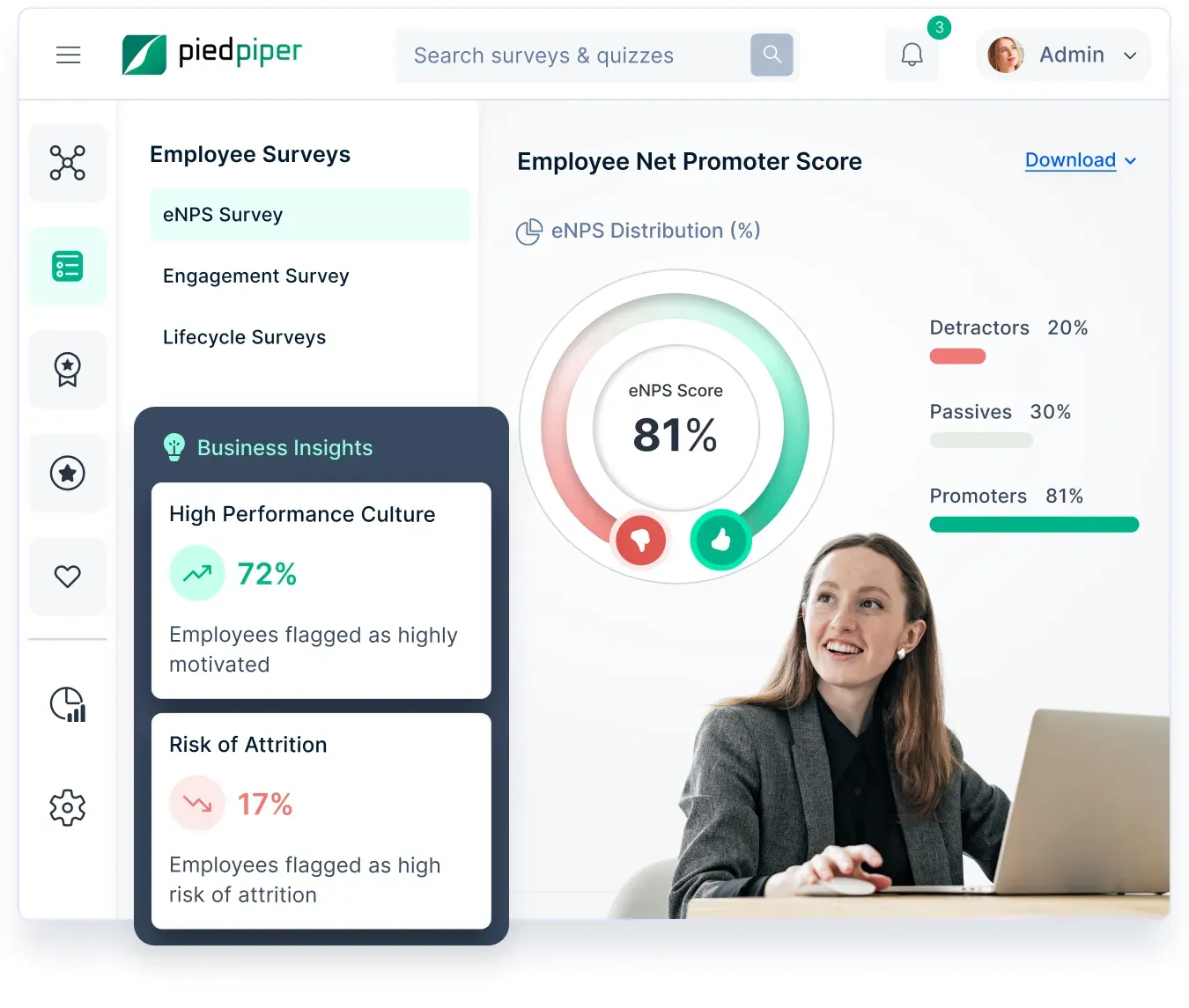20 Stay Interview Questions to Improve Employee Retention
Stay interviews help organizations understand what keeps employees engaged and what might push them to leave. This guide covers 50 stay interview questions, best practices for conducting them, and how they can improve retention and workplace satisfaction.
On this page
Employee retention is as critical as recruitment, yet many organizations focus more on hiring than retaining their best talent. High turnover disrupts workflow and increases costs related to hiring and training replacements. Instead of waiting for exit interviews to understand why employees leave, stay interviews help uncover what keeps them motivated and committed.
Using stay interview questions for employees, managers can identify job satisfaction drivers, workplace challenges, and potential concerns before they lead to disengagement or resignations. Unlike annual reviews, employee stay surveys create open conversations that empower employees to share feedback on their experience, growth opportunities, and workplace culture.
To help businesses implement practical employee stay interview questions, we’ve compiled a list of 20 insightful questions. These will encourage honest dialogue, strengthen engagement, and improve retention, creating a workplace where employees feel valued and heard.
Why conduct stay interviews for employees?
Stay interviews provide organizations with a proactive approach to employee retention by uncovering what motivates employees to stay and what might push them to leave. Unlike exit interviews, which occur when it's too late to retain talent, employee stay surveys help companies identify and address workplace issues before they lead to resignations.
1. Understand employee satisfaction
Stay interviews help managers gauge what employees enjoy about their roles, workplace culture, and leadership. This insight allows organizations to reinforce positive aspects of the employee experience.
2. Identify potential turnover risks
By discussing frustrations, challenges, or unmet expectations, managers can address concerns early and prevent employees from seeking opportunities elsewhere.
3. Improve employee engagement
Employees who feel heard and valued are more likely to be engaged in their work. Stay interviews create a culture of open communication and trust, leading to higher motivation and productivity.
4. Enhance career growth and development
Managers can use stay interviews to understand employees' career goals and align them with internal opportunities, reducing the risk of losing talent due to lack of growth.
5. Refine workplace policies and culture
Employee feedback from stay interviews helps shape company policies, improve leadership practices, and create a more supportive and inclusive workplace.
By conducting employee stay interview questions regularly, organizations can boost retention, strengthen engagement, and foster a workplace culture where employees feel valued and heard.
21 Effective stay interview questions you must ask
We've listed 21 of them and a short explanation of why they're important to question.
1. What do you most look forward to when you come to work every day?
The answers can vary widely. For some, their favorite activity may be working with colleagues, while for others, the projects they are working on. Over time, as you collect more data, you may notice some trends here.
For example, if you notice that your company culture is most appealing to most employees, you can use that in your employer branding efforts.
2. What do you fear every day at work?
The same holds true for this issue, but in opposite. If you detect a pattern here, it's definitely time to act.
3. When was the last time you considered quitting your job?
A top performer who considered quitting the business yesterday may require more urgent attention than someone who considered leaving a year ago.
4. What situation made you think about leaving?
This question gives you specific information about an employee. Some people may be thinking of leaving because their job is no longer difficult. Others do it because they don't feel they deserve enough or because they don't feel appreciated.
Knowing what makes someone consider quitting can help you create a more satisfying work experience for them.
5. Would you suggest our company to future employees? why not?
This is a critical issue for your company's image. Employees are regarded as a reliable source by job seekers because they have direct knowledge of what it’s like to work for your business.
6. What would make you want to quit the company?
Although this question may seem similar to question number 4, there is a clear
difference between the two. The situation that makes someone think about leaving often comes from within the company; its culture, work, major disagreement on business direction, etc.
The departure often comes from outside the company; a job you can't refuse, a partner who gets a job in another country, an opportunity to start your own business, etc.
7. What is the best thing about your job?
People naturally like different aspects of their work. Here again, you will see certain responses over time. You can use this information to give employees more of what they like when possible to improve satisfaction and engagement and highlight the great aspects of the job to job seekers.
8. Which part of your job would you quit as soon as possible?
As you gather more information, you will notice new trends. This will help you minimize the non-essential parts of your current employees' jobs.
9. What skills are you not using in your current role?
This question provides you with an indication of where the employee's job might go next.
10. What would make your work more enjoyable?
There are always areas we can improve on. This query can help you figure out where to begin, particularly if you see a lot of similar responses.
11. Do you feel that you have clear goals?
That says something about managing people. If employees consistently answer yes to this, you can praise your superiors. If not, then it must be addressed because clear goals and objectives help employees see their part in achieving the company's goals.
12. What can I do more or less as a leader?
Managers have a significant impact on people's work experience. Therefore, information from this question can be very valuable to optimize the employee experience.
But to get an honest answer, employees must really trust their manager and managers must be humble enough to accept all the feedback they get.
13. What do you think about your potential?
If you want people to stay with you for a long time, it is important to offer them opportunities for professional and career development. Asking this question is important so you can provide them with what they need.
14. Do you feel appreciated and recognized in the company?
Simply stated, if your business can make people feel appreciated and recognise them, it will have a beneficial effect on employee engagement and productivity.
A dearth of appreciation, on the other hand, can cause individuals to relocate - all the more reason to include this topic on your list of housing interview questions.
15. How do you want your effort to be recognized?
Even if you have an excellent employee appreciation program, there are methods to improve it or make it more personal.
16. What do you believe we should be doing as a company that we aren't doing?
Repeated answers to this question are very useful if you want to make your company an even better place to work - both for your current and future employees.
17. What do you think we should definitely change or add to our offices?
As we slowly emerge from the pandemic, traditional beliefs about the role of the office in our work environment are changing dramatically. Ask your staff what they think about it.
18. Are you satisfied with our current task practice? If not, what do you think we should change?
Similarly, ask people what they think about your work at home in a post-pandemic world.
19. Do you have enough tools and resources to do your job right? If not, what is missing?
Whether people feel fully prepared to do their job directly affects their experience - and how well they do their job. Therefore, your answers to this question will be constructive to optimize the technology used by employees.
20. How satisfied are you with the tools you use to communicate with colleagues when you work remotely?
(video calls, chat systems, shared documents, etc.) Especially since remote work is part of the
"new normal", employees must be able to communicate seamlessly with each other (and with your customers).
21. Which software/tool should be discontinued immediately?
We all have that system or tool that we do not want to use (often admin-related). If employees only use it once or twice a year, you can tell that nobody is perfect.
However, if it is a system that people have to use every day, it will hurt the experience of those employees.

Retain Your Best Talent with Stay Interview Surveys
Understand what keeps employees engaged and identify potential concerns before they lead to turnover. Use ready-to-deploy stay interview survey templates to gather actionable insights and improve employee retention.
Download Now
How to conduct stay interviews
Stay interviews are an effective way to understand what keeps employees engaged and identify potential concerns before they lead to turnover. Organizations need a structured approach that encourages open dialogue and actionable feedback to make the most of these conversations.
1. Choose the right timing and frequency
Stay interviews should be conducted regularly rather than waiting for an employee to express dissatisfaction. Many organizations schedule them annually, biannually, or after key milestones like the first six months of employment. Avoid conducting them during performance reviews to keep the conversation focused on engagement rather than evaluation.
2. Set a comfortable and open environment
For employees to share honest feedback, they need to feel safe and assured that their responses will not negatively impact their position. Conducting stay interviews in an informal setting, such as a one-on-one discussion over coffee or a virtual check-in, helps employees feel at ease.
3. Ask meaningful and open-ended questions
The effectiveness of a stay interview depends on asking the right questions that encourage employees to share their experiences and perspectives. Questions should cover job satisfaction, career growth, leadership support, and workplace culture. Some examples include:
- What do you enjoy most about your job?
- What challenges do you face in your role?
- Do you feel supported in your career development?
- What would make your work experience more fulfilling?
- Have you considered leaving the company, and if so, why?
4. Listen actively and avoid being defensive
A stay interview aims to gather genuine insights, not to justify company decisions. Managers should listen attentively, ask follow-up questions, and acknowledge concerns without becoming defensive. Employees should feel that their feedback is valued and taken seriously.
5. Take action on feedback
One of the organizations' most significant mistakes is conducting stay interviews but failing to implement changes. Employees need to see that their feedback leads to improvements. After the interview:
- Summarize key takeaways and share them with HR and leadership.
- Identify recurring themes across multiple interviews.
- Implement necessary changes to address concerns and improve retention.
- Follow up with employees to update them on any actions based on their feedback.
By following these steps, organizations can use stay interviews as a proactive tool to enhance employee engagement, improve workplace culture, and strengthen retention efforts.
Enhance stay interviews with Empuls

Conducting stay interviews is a great way to understand what keeps employees engaged, but gathering, analyzing, and acting on feedback can be challenging without the right tools. Empuls simplifies the process with automated stay interview surveys, real-time analytics, and actionable insights to help organizations improve employee retention.
With Empuls, you can:
- Use ready-to-deploy stay interview templates to collect valuable employee insights.
- Automate survey distribution and response tracking for efficiency.
- Gain data-driven recommendations to take meaningful action on employee feedback.
- Improve engagement and retention by addressing key employee concerns proactively.
Start using Empuls today to make stay interviews more structured, insightful, and impactful in reducing turnover.
Conclusion
conducting stay interviews with employees can be an effective way to improve retention rates and boost employee satisfaction. By asking the right questions, managers can gain insight into what motivates their team members, identify areas for improvement within the organization, and address any potential issues before they become significant problems.
This article's 20 stay interview questions are just a starting point. Managers must tailor their questions to their team's needs and concerns.
Managers can create a positive work environment where employees feel engaged and supported by showing employees that their opinions are valued and their feedback is being acted upon.
FAQ's
What are stay interviews?
Stay interviews are meetings between managers and employees that are designed to gather feedback on why employees stay with the company, what motivates them to continue working there, and what areas of improvement could help them stay longer.
Why are stay interviews important?
Stay interviews are important because they can help managers identify factors that contribute to employee retention and job satisfaction, as well as potential areas of improvement that can be addressed before an employee decides to leave.
When should stay interviews be conducted?
Stay interviews can be conducted at any time. Still, it is recommended that they be performed regularly, such as annually or semi-annually, to ensure that feedback is gathered periodically and consistently.
What are some example stay interview questions?
Some example stay interview questions include: What do you like about your job? What motivates you to continue working here? What would make you consider leaving the company? What areas of improvement could the company focus on? What can I do as your manager to support you better?
How should managers approach stay interviews?
Managers should approach stay interviews with an open and non-judgmental attitude and should be prepared to listen actively and respond empathetically to feedback. They should also be ready to follow up on any issues or concerns raised during the interview.
What should be done with the feedback gathered from stay interviews?
Feedback gathered from stay interviews should be used to identify areas for improvement and develop action plans to address any issues or concerns raised. It should also be used to recognize and reinforce the work environment's positive aspects and identify opportunities to enhance employee engagement and job satisfaction.


















